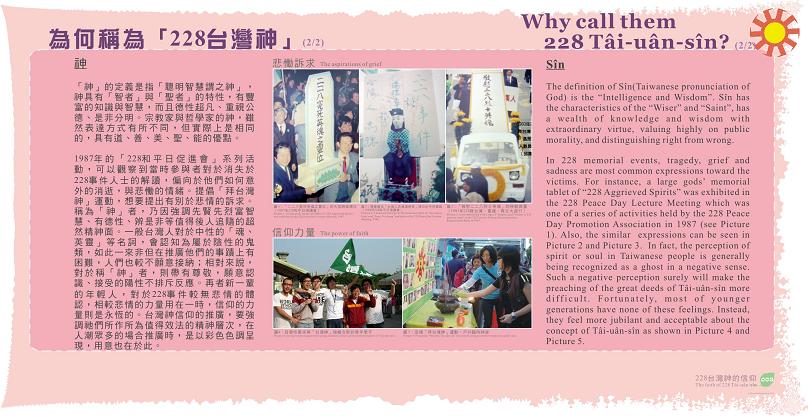
點擊上圖可看大圖
為何稱為「228台灣神」(2/2)
神
「神」的定義是指「聰明智慧謂之神」,神具有「智者」與「聖者」的特性,有豐富的知識與智慧,而且德性超凡、重視公德、是非分明。宗教家與哲學家的神,雖然表達方式有所不同,但實際上是相同的,具有道、善、美、聖、能的優點。
1987年的「228和平日促進會」系列活動,可以觀察到當時參與者對於消失於228事件人士的解讀,偏向於他們如何意外的消逝,與悲慟的情緒。提倡「拜台灣神」運動,想要提出有別於悲情的訴求。稱為「神」者,乃因強調先賢先烈富智慧、有德性、辨是非等值得後人追隨的超然精神面。一般台灣人對於中性的「魂、英靈」等名詞,會認知為屬於陰性的鬼類,如此一來非但在推廣他們的事蹟上有困難,人們也較不願意接納;相對來說,對於稱「神」者,則帶有尊敬,願意認識、接受的陽性不排斥反應。再者新一輩的年輕人,對於228事件較無悲情的體認,相較悲情的力量用在一時,信仰的力量則是永恆的。台灣神信仰的推廣,要強調祂們所作所為值得效法的精神層次,在人潮眾多的場合推廣時,是以彩色色調呈現,用意也在於此。
(未完待續) Why call them 228 Tâi-uân-sîn? (2/2)
Sîn
The definition of Sîn(Taiwanese pronunciation of God) is the “Intelligence and Wisdom”. Sîn has the characteristics of the “Wiser” and “Saint”, has a wealth of knowledge and wisdom with extraordinary virtue, valuing highly on public morality, and distinguishing right from wrong.
In 228 memorial events, tragedy, grief and sadness are most common expressions toward the victims. For instance, a large gods’ memorial tablet of “228 Aggrieved Spirits” was exhibited in the 228 Peace Day Lecture Meeting which was one of a series of activities held by the 228 Peace Day Promotion Association in 1987 (see Picture 1). Also, the similar expressions can be seen in Picture 2 and Picture 3. In fact, the perception of spirit or soul in Taiwanese people is generally being recognized as a ghost in a negative sense. Such a negative perception surely will make the preaching of the great deeds of Tâi-uân-sîn more difficult. Fortunately, most of younger generations have none of these feelings. Instead, they feel more jubilant and acceptable about the concept of Tâi-uân-sîn as shown in Picture 4 and Picture 5.
(to be continued)
聖山教育展版線上導覽-228台灣神的信仰系列:
228台灣神的信仰
發展的背景源由
為何稱為「228台灣神」(1/2)
延伸閱讀:
台灣神
228護國台灣神專區
信仰228─不是宗教
【影片】228台灣神太上真經
台灣神道信仰與宗教修行不同?
228台灣神血肉佈施之源由與台灣建國可行之道
引用台灣大地文教基金會:
https://www.taiwantt.org.tw/tw/index.php?option=com_content&task=view&id=7432&Itemid=1 | 
沒有留言:
張貼留言